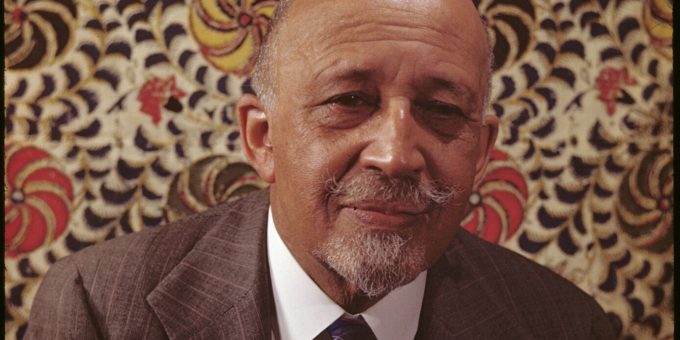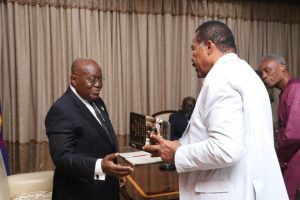
Carl Van Vechten, © Van Vechten Trust. Beinecke Rare Book and Manuscript Library, Yale University
The Scholar Denied and Du Bois’s Legacy in Ghana
The following post is the first in a two-part series celebrating W.E.B. Du Bois and the ongoing efforts by contemporary scholars and activists to preserve and enhance his legacy. This week’s post features an essay written by Dr. Aldon Morris, Leon Forrest Emeritus Professor of Sociology and Black Studies at Northwestern University, describing his recent meeting with Akufo-Addo, the President of the Republic of Ghana. The essay was originally published on the University of California Press blog and is reposted here with permission, preceded by an update from Aldon detailing recent progress in Ghana.
Check back next week for a video Q&A with Aldon Morris and University of California Press Editor Naomi Schneider.
An update from Aldon Morris
Recently the University of California Press published my blog about my meeting with Akufo-Addo, the President of the Republic of Ghana. That meeting at the presidential palace on August 28 in Accra, Ghana, concerned Du Bois’s legacy. I was part of a small delegation assembled to encourage the President to take action to preserve and enhance Du Bois’s legacy. I was chosen to meet the President because of my scholarship on Du Bois, especially my book The Scholar Denied. Our task was to convince the President to transfer the ownership of Du Bois’s homesite from the Ghanaian government to the W.E.B. Du Bois Museum Foundation. This transfer would enable millions of dollars to be raised to transform the site into a vibrant intellectual and conference center to advance and enhance Du Bois’s legacy as a pivotal scholar, humanitarian, and a founder of sociology. For several years, the President neglected to take such action. The purpose of my blog was to seek the mobilization of American sociologists and ASA to join the effort to achieve the transfer.
We recently received great news that at a meeting with the Du Bois Foundation in New York on September 22, the President of Ghana agreed to transfer the property to the Foundation. Thus, the deal has been signed and is now official. The monumental task ahead is to raise the millions of dollars necessary to transform the Center into a living legacy that advances the emancipatory scholarship and activism which Du Bois produced and championed. It is hoped that American sociologists and the ASA will play a vital role in securing these funds that will also hasten the effort to include Du Bois’s scholarship into the sociological canon.
The following essay was originally published on the University of California Press blog and is reposted here with permission.
How can an appropriate legacy be nourished for a historic figure larger than life? That is the challenge faced by Japhet Aryiku the Executive Director of the W. E. B. Du Bois Museum Foundation, the Ghanian President Akufo-Addo, the Ghanian people, scholars, and activists around the world.
The historic figure is W. E. B. Du Bois born in Great Barrington, Massachusetts in 1868 and died as a Ghanian citizen in Accra, Ghana in 1963. Du Bois was the founder of a global emancipatory sociology, and his prodigious writings and activism continue to inform the world about how to achieve human liberation. Throughout his life, these efforts bore fruit: in the formation of the Pan African Congresses establishing Du Bois as a father of Pan Africanism, the Niagara Movement, the National Association for the Advancement of Colored People, the creation of The Crisis magazine, and his pivotal work that helped lay the foundation for independence in Africa, the Americas, the Caribbean, and Asia. As the consummate public intellectual, Du Bois fought for the liberation of people of color worldwide, for women and workers’ rights, Jewish freedom, a peaceful world without nuclear weapons, and global democracy.

A cornerstone of Du Bois’s legacy resides in Accra where he and his wife Shirley Graham worked and lived toward the end of their lives. Their home serves as their eternal resting place and its grounds house an undeveloped museum and meeting spaces. The entire site is owned by the Ghana government. Though Du Bois died sixty years ago, the government has not kept up the property and has not expanded nor enhanced it.
The Du Bois Museum Foundation aims to make fundamental changes to the complex. Their mission is to honor the legacy of Du Bois by “redeveloping and rebranding his final resting place in Accra, Ghana. The interest and dedication of the Foundation is to revive the current Du Bois Memorial Centre into a Museum Complex and as a destination for scholars, artists and heritage tourists alike.” But a major roadblock stands in the way of the nonprofit foundation raising fifty million dollars required to transform the complex: donors will not commit funds because the Ghanian government owns the property. The current president of Ghana claims he wishes to transfer the property to the foundation but continues to delay when the decision seems close at hand.
To convince the president to act, the foundation brings major Du Boisian scholars to Accra to speak and meet with the president. Because of my book, The Scholar Denied, I recently spoke in Accra on the global importance of Du Bois and as a member of a delegation I met the president. Mr. Aryiku asked me to autograph a copy of The Scholar Denied for the president. I dedicated it to the president and the people of Ghana. The president enthusiastically accepted The Scholar Denied as cameras flashed. I was honored.
But my commitment was to help the president reach the decision to transfer the center to the foundation so a fitting, living, legacy of Du Bois can flourish in the land where he chose to complete his work and die. I hope this mission can no longer be denied.
Aldon Morris is emeritus faculty in the Department of Sociology at Northwestern University. He is the author of The Scholar Denied: W.E.B. Du Bois and the Birth of Modern Sociology.

Comments